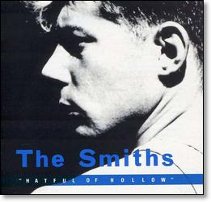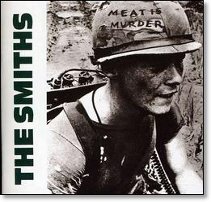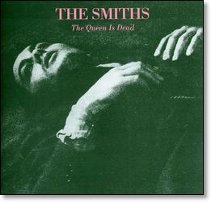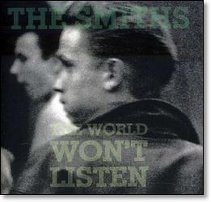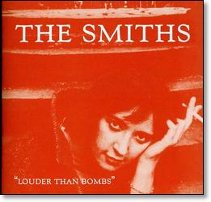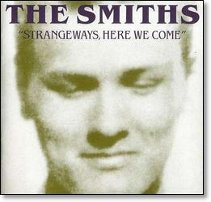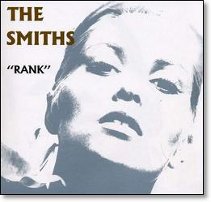A Downloader's Diary's Guide to the Smiths:
Bigmouths Strike Again
by Michael Tatum
Because the hyperactive British music industry covers such little
geographic ground, careers can often explode, burn, then smolder into
ash in alarming record time, which explains why this beloved
Manchester quartet could release four albums and ten standalone
singles in a mere four years, never chart a 45 higher than #10 in
their homeland, yet be missed so intensely after their breakup that
they've been offered millions of dollars to re-form for an afternoon
-- proposals they've shot down without exception. Choosing their
moniker precisely for its anonymity, the Smiths revolved around the
strangely glorious partnership of two opposites, forged when nonpareil
guitarist Johnny Marr (born John Maher) knocked on the door of
bohemian eccentric Stephen Morrissey (who would drop the Christian
name he hated soon enough) to play Leiber to his Stoller in May of
1982. Although the duo originally imagined themselves as songwriters
rather than performers, they soon rethought that strategy, and with
the addition of bass player Andy Rourke and drummer Mike Joyce --
both, like Marr and Morrissey, working class and of Irish ancestry --
the band came together in December of the same year. Despite their
collective professional inexperience, success arrived surprisingly
quickly: they released their debut single, the bewitching "Hand in
Glove," in May of '83, recorded four legendary sessions for John
Peel's radio show between May and August, while simultaneously hashing
out their debut album on Rough Trade (then the UK's preeminent indie
label) with Teardrop Explodes guitarist Troy Tate. But when
pro-producer John Porter worked magic on an interim single -- the
masterful comedy routine "This Charming Man," in which a "jumped-up
pantry boy who never knew his place" talks Morrissey's sexually
confused nerd-protagonist out of an ill-advised marriage -- Rough
Trade prexy Geoff Travis was impressed enough to ask Porter to salvage
the job everyone in the band's orbit thought Tate had botched. And how
did that turn out? That and more in this, A Downloader's Diary's
second full-artist exploration (the first was KISS).
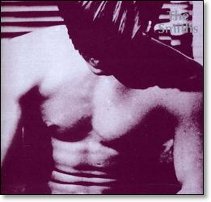 |
The Smiths: The Smiths (1984, Sire) Their legions of
acolytes unfairly blame producer John Porter for this debut's flat
sound rather than copping to the early Smiths' tendency for
woolgathering -- indeed, the band had already recorded most of these
tracks three or four times without success. That in itself must have
been dispiriting, though it's worth noting Porter himself found the
duo's early material "meandering," and having been together only a
short time, the band must have been too preoccupied feeling out their
dynamic to brighten the arrangements -- Andy Rourke in particular is
more sedate here than he would be from the spritely "This Charming
Man" onward. Revisiting this record for the first time in years
however, the overall tone strikes me as fitting to the material. With
the exception Morrissey's well-timed delivery of the slacker credo
"No, I never had a job/Because I never wanted one," the wit that would
become their calling card is purposefully almost completely
absent. Instead, they languidly unfurl -- in what had to have been a
first for rock and roll -- a somber bildungsroman in which a teenage
boy loses his virginity to an older man: "It's time the tale were
told/Of how you took a child and made him old." With occasional
detours for class-conscious sarcasm and punk nostalgia, this part
tender, part painful experience and its aftermath is explored from all
angles: wistfully on "Reel Around the Fountain," role-reversed on "The
Hand that Rocks the Cradle," out-and-proud on "Hand in Glove,"
bitterly on "What Difference Does It Make," and on two ill-advised
heterosexual detours thrown in for good measure, with abject
humiliation. Leading up to a song the significance of which I had
never fully registered: "Suffer Little Children," a lugubrious
rumination on Manchester's gruesome "Moors Murders." Years later, it's
still unlistenable, but thematically it's revealing -- a song about
the vulnerability of trusting innocence falling into the wrong hands,
a metaphor for what might have happened had young Stephen's first
sexual experience been with someone more devious. So maybe we should
shift the blame for this one to the auteurs, one of whom wasn't ready
to be a star, and the other of whom merely followed his
lead. B+
The Smiths: Hatful of Hollow (1984, Rough Trade) An
accidental classic, released budget-priced in the UK because Rough
Trade conceived it as stop-gap product between proper records, the
unlikely definitiveness of this compilation suggests divine
intervention. Famously comprising ten songs culled from the BBC radio
shows that preceded their proper debut and peppered throughout with
six songs originally appearing on singles, one wouldn't expect it to
cohere. Showcasing the attractively agile jingle-jangle hooks that
made them famous would be one thing, but this adds an unlikely extra
dimension by documenting the fiery energy completely absent from their
later records, which were sometimes emasculated to the point of
passive asexuality -- comforting to their doleful acolytes, but
completely useless to curious outsiders. If several of the songs later
remade for The Smiths are a draw (surprise: session rat Paul Carrack
does have his uses), this primal "What Difference Does it Make"
punches holes in the studio wall, while the remaining obscurities
display the band at their most graceful (the fluttering "Back to the
Old House," the exquisite Shelagh Delaney re-write "This Night Has
Opened My Eyes") and brutal (the salaciously carnal "Handsome
Devil"). And the landmark singles reveal how key producer John Porter
was to their early success, including three from one legendary
twelve-inch: the cattily anti-marriage "William, It Was Really
Nothing" and the deceptively beautiful "Please, Please, Please, Let Me
Get What I Want" each get their business done in roughly one hundred
and twenty perfect seconds. Their B-side, this record's centerpiece,
the monolithic "How Soon Is Now," was the reason scrawny teenage kids
like me coughed up import-prices for this collection's first CD
reissue in the late '80s, after which it took permanent residence in
our record collections, right next to Murmur and Candy Apple
Grey. Were we fools to blow those hard-earned twenty bucks on a mere
sixteen songs? You shut your mouth. A
The Smiths: Meat Is Murder (1985, Sire) With Margaret
Thatcher de-regulating the market, crippling the power of unions, and
invading the Falklands to boost her sagging approval ratings, England
circa 1985 would have been a fine time for agitprop. Unfortunately,
despite what you've heard, this ain't it -- unless you count the
repulsively carnophobic title track and the two that come out against
corporal punishment (the latter especially not a particularly
controversial stance) there's nothing here that could be described as
explicitly political per se. Even the one in which the Moz drops his
pants to the Queen ("I'm a man of means/Of slender means,") signifies
more as satire than protest. But of all Smiths records, this is the
one that engages the most with the outside world, which I suspect is
why many fans consider this the dark star in their catalog, and also
why -- what a coincidence -- it rocks the hardest, particularly on the
first six songs of the original UK release (leave "How Soon Is Now" on
Hatful of Hollow where it belongs, please). The middle triptych on
side one sympathetically addresses a working class that only finds
release from provincial boredom in sex and violence -- a stabbing at
the fairground juxtaposed against lovers scrawling their names on
their arms with a fountain pen, illicit sex in a railway station alley
when the marriage bed gets dull, the "tattooed boy from Birkenhead"
who awakens the prudish bookworm's libido in the pile driving "What
She Said." And the two songs sandwiching that sequence are two of
their undeniable peaks: "The Headmaster Ritual," a condemnation of
"the belligerent ghouls who run Manchester schools," and "That Joke
Isn't Funny Anymore," in which Morrissey joylessly blows a smug
journalist in the backseat of his car, only deriving satisfaction from
the knowledge that someday, inevitably, that empty cynic will one day
be as lonely as he is. B PLUS
The Smiths: The Queen Is Dead (1986, Sire) Americans
guffaw at the bald-faced football mentality of UK music magazines,
like when NME myopically declared the Arctic Monkeys' debut the fifth
all-time greatest British album the month of its release. Though I'm
sure a similar argument could be mounted against Rolling Stone and its
reflexive five star reviews for Bob Dylan, in a perverse sort of way I
admire the Brits for that -- what links the Kinks, Blur, and the Jam
(not Oasis) is a healthy disinclination to cater to the tastes of the
American audience, undoubtedly why their countymen cherish them, even
if those bands sometimes sound grumpily reactionary to us Yanks. This
analysis applies as well to the record Q anointed the third best album
of the '80s, which limits its political statements to swipes at the
Royal Family, spends two songs dishing on Morrissey's gleefully
antagonistic relationship with the British press, and dedicates two
more to Dole Age denizens who would rather spend their time debating
Wilde and Keats in graveyards than suffering through the indignation
of day jobs. Though not wholly convinced myself of its supposed
masterpiece status, as a compact disc this makes more sense than a
piece of vinyl -- "I Know It's Over" may be their most epic weepie,
but sequenced alongside the dirge-like "Never Had No One Ever," it's a
leaden doorstop in the middle of side one. Likewise, even if one of
the two throwaways charmingly celebrates a cross-dressing vicar, their
positioning toward the end of side two ends the record on a
misbegotten note. That leaves their two greatest achievements. In the
title powerhouse, the band razes Buckingham Palace with a wrecking
ball while Morrissey greets Her Majesty with "a sponge and a rusty
spanner" to chat her up on the wretched state of the nation. The other
is a tribute/parody to melodramatic teenage death ballads in which the
undying light of young love is subsumed by an oncoming double-decker
bus. Following that with a bemused ode to a nudie calendar is an act
of typically droll British self-deprecation. Which is funny. But
still. A MINUS
The Smiths: The World Won't Listen (1987, Rough Trade)
This half-cocked gambit to assemble a Hatful of Hollow 2 might
have made the grade had Rough Trade waited a measly three months --
this band was that prolific -- for the twelve-inch of "Sheila Take a
Bow," which would occupy three of the first four tracks on this
record's stateside equivalent Louder than Bombs, released later that
spring. Instead, they compensate by lazily reprising four mega-obvious
titles from their previous two studio releases to pad this out to the
requisite seventeen tracks (the infamously horrid Twinkle cover
"Golden Lights" was added to subsequent digital reissues). The five
good-to-great A-sides (including one rejected) prove the band had
mastered the catchy single -- the eternal cheap shot "Panic," with its
irresistible exhortation to "Hang the DJ!" is an obvious highlight --
but except for the startling bridge of the culture-thieving
"Shoplifters of the World Unite," what's missing is depth. I know
that's a tall request from such perpetual post-adolescents, but it
reminds me why smart people prefer albums to singles -- not because
they're organically conceived by the artist rather than than thrown
together by some label lackey (indeed, a good compilation would
qualify in this category) but because good ones are laid back to front
in such a way that respects variety, flow, and nuance. By contrast,
this is inevitably more haphazard, making room for two superfluous
instrumentals (instrumentals? from the Smiths?), the self-parodic
"Unlovable" ("I wear black on the outside/'Cos black is how I feel on
the inside?") and the socially irresponsible suicide paean "Asleep."
Leaving profundity to four-count-'em-four stellar obscurities: two
very different takes on kids leaving the North for the big city,
Morrissey's truest/only celebration of sexual devotion, and the
astonishing "Rubber Ring," in which the auteur acknowledges that "the
songs that saved your life" -- i.e., his songs -- will fade into
sentimental memory once his audience grows up. B
The Smiths: Louder than Bombs (1987, Sire) Purchased on
an innocent whim by yours truly on a San Francisco choir trip to
impress high school crush L, the nostalgist (and perhaps solipsist) in
me believes "Is It Really So Strange?" should be the first Smiths song
everyone should hear -- better to convert the benighted to the Moz's
unique persona with a wacked-out travelogue in which the protagonist
murders a nun in a dither of sexual confusion than with a stately
ballad in which a variation on that character loses his virginity to
an older man, even if in the end, the latter is truer to his
vision. This twenty-four track pig-out, designed as a primer for the
American audience and similar in functionality to Sire's less messy
(if more juvenile) Catching Up With Depeche Mode, starts off
strong and doesn't include any tracks owners of their three proper
studio albums would have already owned -- even the lone repeat, "Hand
in Glove," is the superior single version. But it ignores chronology,
frustratingly compresses the mix, signs off with the two-song nadir of
The World Won't Listen, and chooses inferior versions of "These
Things Take Time" (slicker), "Back to the Old House" (more
conventional), and "Stretch out and Wait" (would you believe,
Morrissey turns out to be an impressively subtle vocal stylist?). If
this was the only Smiths record I owned, I'd probably (please excuse
the cliché) play it to death. But in more ways than one, this could
give unsuspecting young people the wrong idea. B PLUS
The Smiths: Strangeways Here We Come (1987, Sire) Bored
with feeling locked into six-string jingle-jangle and perhaps --
though Marr denies this -- slightly pressured to beef up the sound to
take the band to the stadiums like R.E.M. and U2, this boldly
announces its paradigm switch by not even incorporating guitar into
the tango-ready arrangement of the destiny-manifesting opener "A Rush
and a Push and the Land is Ours." Consciously taking The White Album
as its model, this flitters all over the genre map: glam, zydeco,
folk, whatever the fuck the two-minute travesty "Death at One's Elbow"
is. When it works, as on the cataclysmic "Death of a Disco Dancer,"
which casts a cynical eye at the baggy hordes collapsing from extreme
dehydration at Ecstasy-fueled raves, or the lovely "Girlfriend in a
Coma," which shows up adolescent revenge fantasies for the empty
boasts they are, it almost justifies Stephen Street's dense, theatric
production. But when it doesn't, as on the overrated "Last Night I
Dreamt Somebody Loved Me" (Morrissey rips the t-shirt from his chest
while emoting atop Mt. Sensitive), the limp threat "Unhappy Birthday"
(didn't you learn your lesson on "Girlfriend in a Coma?"), and the
sourly prescient "Paint a Vulgar Picture" ("Re-issue! Re-package!
Re-package!") you're reminded how much of a difference a carefully
drawn lyric can make. When your pettily banal closer only gains its
modest modicum of interest from its putative hidden message to your
songwriting partner, that's a problem. B
The Smiths: Rank (1988, Sire) A post-mortem live album
borne out of contractual obligation presents all kinds of problems,
beginning with the obvious fact of being at the mercy of the material
left at your disposal, in this case a set recorded at Kilburn's
National Ballroom in October 1986, right around the release of "Ask"
and naturally showcasing material from the current The Queen Is
Dead. One would figure Morrissey's impishness would translate well
to a live setting -- consider stunts as the band's Top of the Pops
performance of "William, It Was Really Nothing," in which he crooned
the initial verse while dreamily propping his head on his hands, then
coming to life for the chorus by ripping open his shirt to reveal the
sardonic slogan MARRY ME. But on that appearance they mimed to
pre-recorded tracks -- here, the band rushes the tempos, at times
reducing Morrissey to flubbing lyrics so that they resemble
incomprehensible animal noises. Likewise, Marr's guitar-playing, often
elegantly interwoven on these songs' studio incarnations, here leans
heavily on vague wah-wah washes and depressing showbiz moves like
replacing the lilting highlife figure dancing through "The Boy With
the Thorn in His Side" with a bluntly loutish bleat worthy of an
Aerosmith solo. Although I will say the brief but delightful snippet
of "Marie's the Name (of His Latest Flame") that contextualizes
"Rusholme Ruffians" for the young'uns does make me pine for a whole
album of Elvis covers. It's not too late,
guys. B MINUS
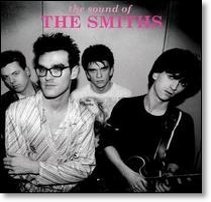 |
The Smiths: The Sound of the Smiths (2008, Rhino)
It's said that singles represent this band's natural métier, which is
why most fans revere 1995's self-explanatory Singles, which marches
chronologically from "Hand in Glove" (May 1983, didn't chart, and what
do you expect with homoerotic cover art) to "Last Night I Dreamt
Somebody Loved Me" (December 1987, highest UK chart-placing #30) and
encoring with the single-that-should-have-been "There Is a Light That
Never Goes Out." It's serviceable and consistent in ways their proper
studio albums are not, and can be found cheap from the usual online
sources. But though the deluxe 2-CD version adds an extra disc of
unwisely chosen ephemera, I prefer this more thoughtfully compiled
2008 upgrade, which augments Singles' original eighteen tracks
with five mostly early vintage add-ons that remind us first and
foremost they were a rock band, not merely a cult pop
phenomenon. Occasionally you could imagine subbing a selection here
and there -- I would have switched Meat Is Murder's laughable
funk workout "Barbarism Begins at Home" with "What She Said" or
"Rusholme Ruffians," and Marr's folk leanings are criminally
shortchanged. But from declaring your short-lived romance by bragging
that "the sun shines out of our behinds" to offhandedly noting that
"eighteen months hard labor" is a fair enough penance for your
interpersonal fuckups, this smashes the canard this band was strictly
for mopes and schoolmarms -- with a few devastating exceptions, almost
every one of these songs boasts at least one line that will make you
laugh out loud. I'll assume you already knew that. But this improved
configuration more deftly showcases the wily moves and clever riffs of
the greatest British rhythm guitarist this side of Keith
Richards. Play "Brown Sugar" alongside "The Headmaster Ritual," or
"Jumpin' Jack Flash" alongside "Bigmouth Strikes Again" and "How Soon
Is Now," and ask yourself the real reason why Johnny Marr's former
partner hasn't been the same since NME declared the Smiths were
dead. A
May 16, 2014, Odyshape
|


